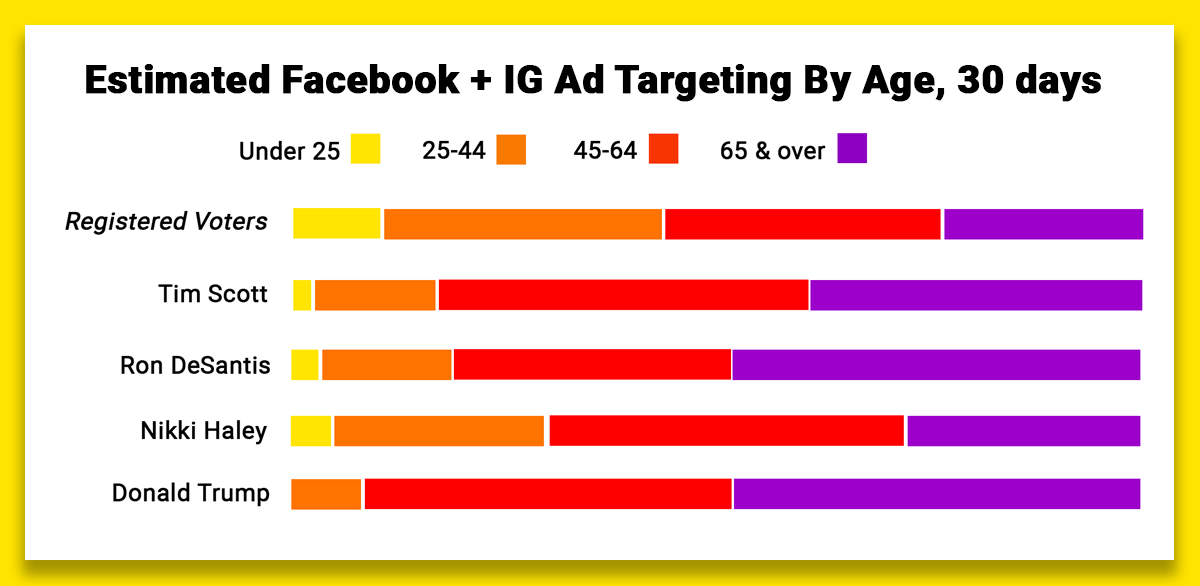Republicans are running for President - mostly without young voters, as seen in FWIW
Major GOP campaigns have thus far stayed away from strategies aimed at reaching younger audiences online.
Today’s edition is being published in partnership with FWIW (For What It’s Worth), a weekly newsletter by Kyle Tharp that breaks down digital spending, strategy, tactics, and trends in our elections. Subscribe here!
Young Republicans are the first to say it:
“It’s not a secret. The Republican Party has a youth vote problem,” says Karly Matthews, the 25-year-old communications director for the conservative climate group the American Conservation Coalition. It's a refrain we’ve heard over and over since Democrats trounced Republicans among younger voters in last fall’s midterm elections - in part due to the party’s disparate online outreach efforts.
With 2024 on the horizon, what are the leading GOP presidential candidates doing about that? How are they attempting to reach younger voters online? Do they even need to? Kyle and I teamed up to take a look 👀
But first…
Another Gen Z candidate is running for Congress
26-year-old Joe Vogel, a Maryland state Delegate, is the latest Gen Z candidate to announce a run for a US congress. As a state Delegate, Vogel has already prioritized student mental health, healthcare, and combating hate crimes. He said he’s running for Congress to address the “urgency” of today’s most pressing issues. He joined The Up and Up this week to discuss his campaign launch. Take a peak.
Republicans are running for President - mostly without young voters
Young voters have turned out at high rates the past three election cycles, making headlines and pushing back against an outdated narrative that young people are generationally politically apathetic. After all, many young people in today’s America have felt that their rights are under attack — from the threat of gun violence, to climate change, and the Supreme Court’s decision to overturn Roe v. Wade (to name a few high-stakes issues on the minds of the country’s youngest citizens) – and they’ve tuned into politics in an attempt at pushing back.
Instrumental in helping secure President Joe Biden’s 2020 victory and critical to Democrats’ unexpected success in the 2022 midterms, young voters have grabbed the attention of politicos and campaign operatives who understand their political power.
There’s now a Gen Z member of Congress, Gen Zers in the White House, and externally, young people are making noise about the power of their generation (both on the right and the left). Their claims aren’t in vain – there are 17 million young people who will have turned 18 between the 2020 and 2024 presidential elections (making them eligible to vote) and in 2024, Gen Z and millennials will make up 45% of the potential electorate, according to stats from Brookings demographer William Frey shared with CNN’s Ron Brownstein last year.
There’s no guarantee that young voters will turn out at high rates again in 2024 – especially given the current state of gloom and doom that has left many young people feeling disenchanted by the status quo. But in close races, the ability to turn out young people can mean clinching the margin of victory – so it’s a worthy pursuit to engage them.
With the high stakes of 2024 on the horizon, and given young voters’ historic preference for Democrats, Republicans young and old have sounded alarm bells about the GOP’s youth vote problem. How are the Republican candidates for President attempting to reach these audiences online? Well, it’s complicated…
Digital advertising
Since the Republican presidential primary electorate (and donor base) typically skews geriatric, none of the GOP campaigns have prioritized targeting younger voters in their digital ads. Just one example is on Facebook and Instagram, where each of the candidates has targeted younger users at a far lower rate than their older counterparts. None of the campaigns have experimented with digital ads specifically targeting younger audiences.
We should note this type of targeting breakdown is not uncommon in Facebook advertising for fundraising, as many grassroots donors on both sides of the aisle tend to be older. Digital consultants’ mandate is to focus on immediate ROI, so they’re going to actively target users who are most likely to give.
One thing that stands out as a missed opportunity is Nikki Haley’s campaign, which has made age and “mental competency tests” for older politicians a feature of her stump speech. Her team has actually excluded younger audiences from ads mentioning that talking point. If her campaign was to package that message in some targeted vertical video ads on Snapchat or Instagram, it would probably be well received.
That said, Haley’s campaign has targeted younger audiences at a slightly higher rate than most of her rivals. The youngest GOP candidate running for President, anti-woke crusader Vivek Ramaswamy, is running slick vertical video ads ripe for millennial and Gen Z consumption. However, like the rest of the field, his team is generally excluding younger users from seeing this content.
In fact, Ramaswamy seems outright hostile to the idea of some young people voting. This week, POLITICO reported that his longshot campaign is rolling out a proposal to raise the voting age to 25 years old.
Tiktok, Snapchat, and influencer engagement
Perhaps the single-most important fact about the current state of Republican youth vote online outreach is that so far none of the GOP presidential candidates or their affiliated outside groups are on TikTok, where millions of young people spend their time. According to TikTok’s CEO, the viral video app has 150 million active users in the United States, and users average a whopping 1.5 hours each day watching content there.
Mostly due to the party’s hardline positions on China (and security concerns around the app’s Chinese ownership) digital strategists affiliated with several of the presidential campaigns told us their candidates have no intention of joining the platform anytime soon. That position is essentially ceding the field to Democrats, who are increasingly creating content on the popular app.
“Our party says we can’t be on TikTok for privacy and security reasons,” GOP strategist John Brabender told The Hill in December. “Well, that’s great, but you better come up with an alternative really quickly, then, because we have a whole generation growing up with that being their number one news source yet we’re not talking to them there.”
While Joe Mitchell, a 26-year-old former Iowa state representative and the founder of Run GenZ, a group that recruits and trains young conservatives running for office, doesn’t necessarily think the Republican Party should be on TikTok (due to those privacy concerns), he says that as long as the app exists and influencers are using it to talk about politics, Republicans need to find a way to capitalize on the audience there, too.
“TikTok reaches a lot of youth voters, specifically,” Mitchell tells us. “As long as it’s out there and not banned yet, then we need to utilize that… we have to compete with the Democrats.”
“I wouldn't advise any Republican candidate or campaign to have an official TikTok presence, so we just have to get more creative,” says Amanda Elliott, a Republican strategist and author of the Doomscroll newsletter. “How else can we get the attention of young voters? We've totally dropped the ball on getting into the influencer game. That's one place we could start.”
Influencer engagement on apps like TikTok and Instagram is becoming a major plank of Democrats' (and the Biden campaign’s) digital strategy - and Republicans are eager to invest in the tactic. One prominent GOP digital strategist recently tweeted, “stop sleeping on influencers…they’re effective.”
Another option for reaching younger voters online is Snapchat, an app that is still commonly used by GenZers and younger millennials. While that platform allows for political advertising, Republicans historically have failed to invest in paid voter outreach there. As of now, not one of the 2024 Republican presidential candidates or their affiliated PACs has advertised on Snapchat.
Trying to make a change
In the wake of Republicans’ poor performance with young people last fall, the Republican National Committee is reportedly launching a “Youth Advisory Council” aimed at improving the party’s messaging toward younger voters. According to Breitbart this week, the council will “focus on communication, social media, and field operations.”
16-year-old Brilyn Hollyhand, who published an op-ed in January about the Republican party’s lack of youth engagement, is serving as a co-chair of the council.
“Our plan with the council is to engage with youth voters where they are - online, so we’re planning social media marketing campaigns and different ways to use the RNC’s preexisting social media infrastructure,” Hollyhand told us via a text message. While he emphasized that the RNC is not on TikTok and told Fox News last week that he recognizes the security risks with the app, Hollyhand has over 50k followers on the platform. “I’m not necessarily saying that the RNC needs to be on TikTok… but if we’re not on there then it’s just going to be the Democrats,” he said.
Joe Mitchell, who’s also serving on the RNC’s Youth Advisory Council, said when it comes to Republicans' youth vote crusade, the GOP needs to not only meet young people where they are, but also talk about the issues they’re prioritizing – namely women’s health care, the environment, and gun violence.
“I don’t think Donald Trump or Ron DeSantis’ main platform should be about women’s healthcare, the environment, or gun violence,” he said, “However we can’t just completely ignore it. And that’s where the RNC and outside groups need to come in and be on TikTok, Snapchat, Instagram, setting the narrative before the Democrats.”
Karly Matthews, communications director for the center-right American Conservation Coalition, is in agreement on the need for Republican candidates to talk about issues young voters care about - not just use the latest app or social platform. “What we’re really focused on is having a Republican nominee who is ready to address environmental challenges whether that be climate change, environmental issues, conservation, clean energy… Someone young conservatives can look up to and say he or she has a very robust environmental platform that we can look to and believe in.”
Beyond the Youth Advisory Council, the RNC is hosting the first Republican primary debate in August in collaboration with Young America’s Foundation (founded by former Wisconsin Gov. Scott Walker, who lamented on Twitter last month that “young voters are the issue”) and Rumble – a move that appears geared at attracting younger audiences.
At the end of the day, campaign operatives will tell you that it’s a lot easier to try to reach the existing electorate rather than to attempt to change or expand it - and the voters traditionally needed to win a GOP primary skew older. But, in a crowded field during an unconventional election year, reaching more potential younger voters in places like Iowa or New Hampshire could provide at least one of the GOP candidates with an edge.
“I don't care who you are or what party you're in, you shouldn't intentionally decide to leave voters on the table and cede an entire voting block,” says Elliott. “As Republicans, we should be communicating our values and principles to everyone and if we're not doing that, we deserve to lose.”








